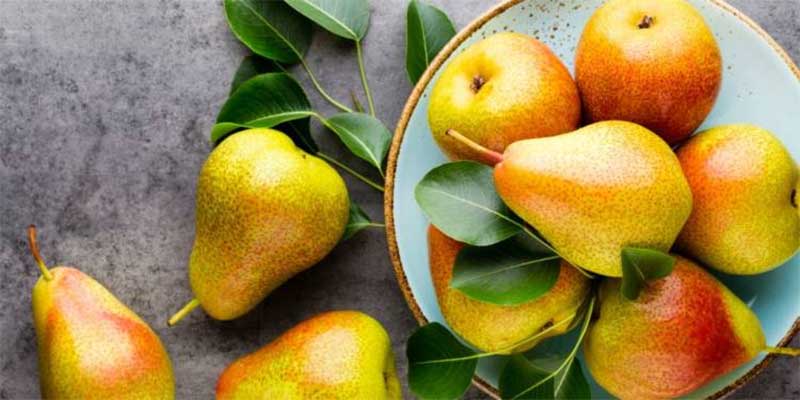Pears are among those fruits that people don’t pay enough attention to. While some people call the fruit the ‘ugly step-sister’ of apple, it packs almost the same nutrients and minerals as its beautiful sibling. A pear is a sweet, mild fruit that has a fibrous center. It is rich in dietary fiber, plant compounds or phytonutrients, and antioxidants. If we define pear fruit in short, it is a fruit that packs all the nutrients in a cholesterol-free, fat-free, 100-calorie package.
This fruit ripens the best once it is off the tree. That’s why special attention is needed at the time of harvesting. Unlike other fruits, pears ripe from the inside out. This is the reason why many people confuse it for being unripe or flavorless. Thus, it is extremely important to pick the perfect pear from the market if you want to experience its true taste. Doctors advise people with diabetes and heart conditions to include pear in their diet. If you are still not convinced, this post will help you garner all the knowledge about pear fruit, from health benefits to nutrition value, and more.
Nutritional Value of Pear
Pears contain essential nutrients and minerals required for our body. Let’s have a look into its nutrition value. A 100-gram serving of pears contain:
- Calories – 57
- Carbohydrates – 15 grams
- Total Fat – 0.1 gram
- Protein – 0.4 gram
- Dietary Fiber – 3.1 gram
Health Benefits of Pear
Pears have been enjoyed since ancient times. These bell-shaped fruits are sweet with a little tang of sourness that can be eaten soft or crisp. They offer a plethora of health benefits that have been backed by science and medicine. Let’s learn how eating pears are beneficial for your health.
1. Good For Skin And Hair
Vitamin A is the most versatile nutrient. It is beneficial for keeping the skin, hair, and nails healthy and beautiful. Pears contain good amounts of vitamin A that can help in keeping your skin and hair healthy. It is also enriched with nutrients like zeaxanthin and lutein that take part in a number of organ functions and enzymatic reactions. This also helps in keeping the skin youthful as it reduces age spots and wrinkles. If you want healthy skin and hair, you should increase your intake of vitamin A. Pear is one such fruit that has this mineral in abundance, allowing you to keep up with your recommended daily intake.
2. May Improve Bone Health
The fruit contains copper, calcium, phosphorus, manganese, and magnesium in significant amounts, which all play a crucial role in bone health. These minerals might be required in very small amounts but plays a crucial role in keeping the bones strong. People with conditions like osteoporosis are advised to include pears in their diet as it helps prevent and treat debilitating conditions and bone mineral loss. It ensures that your bones are getting enough minerals to grow and protect against inflammation and other conditions.
3. Helps Reduce Inflammation
Pears are rich in flavonoids and antioxidant components. Research has shown that the anti-inflammatory properties of pear help in reducing swelling and pain associated with inflammation. People suffering from symptoms of gout, rheumatic conditions like arthritis, and the like should eat pears to ease the symptoms and prevent them from worsening thereby also improving the quality of life. Moreover, there are several studies that show a positive association between inflammation and metabolic diseases like diabetes, heart diseases, and even cancer. Also, nutrients like vitamin C and K help in fighting inflammation, which is found in abundance in pears.
4. Helps In Improving Blood Circulation
Pears can be very beneficial for patients suffering from mineral deficiencies like anemia, among others, as they are high in iron and copper content. Increased levels of iron in the body boost the synthesis of red blood cells. On the other hand, increased levels of copper in the body facilitate the synthesis of essential minerals and the absorption of iron into the system. When your body has sufficient minerals to support the organs, you can prevent muscle weakness, cognitive malfunction, fatigue, and organ system malfunction. This is the reason why doctors advise kids and adults equally to consume foods rich in adequate amounts of copper and iron. With pears, you can ensure a significant percentage of these essential minerals in your diet.
5. Helps With Healing
Pears are a good source of vitamin C and thus help in healing wounds. Ascorbic acid helps in synthesizing cellular structures of the body and new tissues in the various organs. So, whenever there is a burn or cut, it makes sure that the damaged area is healed quickly. If you are injured, you can include pears in your diet for fast healing.
6. Improved Heart Health
There are several studies and researches published emphasizing the impact of pears on heart health. According to these studies, pears are one of the fruits that have an inverse relationship with stroke risk. Since pear fruit is high in the potassium content, it means the fruit has a significant impact on the health of the heart. Potassium acts as a vasodilator (an extremely good one) that helps in lowering the blood pressure. This results in increased blood flow in all parts of the body that helps in providing oxygen to organs. This oxygenation of the organs promotes their effective function. If you are a heart patient or want to prevent heart conditions, you must include pears in your daily diet. Also, the high fiber content in pears ensures good heart health.
7. Pear Helps In Boosting Immunity
In a study published in The American Journal of Clinical Nutrition, it was found that vitamin C and vitamin A found in pears, benefits in boosting immunity. Pears are a rich source of vitamin C minerals that work as a great antioxidant. Antioxidants help in stimulating the production of white blood cells, which are critical to the immune system. This ultimately makes your immune system stronger, allowing your body to ward off conditions like mild illnesses like flu, cold upset stomach, and more. Also, due to its free radical scavenging activity, antioxidants prevent any damage caused by free radicals.
8. Pear Has Anti-Cancer Properties
The antioxidant properties in pear have the potential to kill cancer-causing cells in our body. Antioxidants are renowned for their anti-carcinogenic activities that have been connected to the prevention of cancer. According to some studies, phytonutrients like flavonoids and cinnamic acids found in pears helps reduce the risk of cancer. The antioxidants work in a way that it flushes out free radicals from the body, allowing for new and healthy cell growth.
9. Pear Is Linked To Lower The Risk Of Diabetes
There are different varieties of pears cultivated. The red varieties of pear are known to help in reducing the risk of diabetes. Pear is an anthocyanin-rich fruit, which is directly associated with diabetes. During a study, it was found that over 200,000 people who consumed five or more weekly servings of red pears were 23% less likely to experience type-2 diabetes. On the other hand, a lab experiment found out that pear peel contains anthocyanins that exhibit both anti-inflammatory and anti-diabetes effects. Moreover, since pear is a fibrous fruit, it slows down the digestion process, giving your body more time to break down and absorb carbs. As a result, your blood sugar levels regulate properly, potentially helping you to control and prevent diabetes.
10. Pear May Promote Gut Health
As stated above, a pear is an excellent source of insoluble and soluble fiber that is essential for digestive health. Consuming fiber-rich foods is important as it helps in maintaining the bowel regularity by bulking up and softening the stool. A single pear contains about 6 grams of fiber, which is 22% of your daily fiber needs. So, by eating a pear a day, you can keep your digestive system on track. Moreover, soluble fibers are responsible for feeding the healthy gut bacteria. Healthy gut bacteria mean improved immunity and healthy aging.
Pears And Weight Loss
If you hear people saying that they are being told to include pears in their weight loss diet, don’t roll your eyes because that’s what pears do. They can play a crucial role in your weight loss journey. For starters, pears are rich in fiber content that helps you feel satiated for a longer duration. This prevents you from munching at odd hours. Moreover, pears are one of the few fruits that are low in calories. Eating pears allows you to keep a tab on your calorie intake. On the other hand, the fruit is high in water content that makes it high in volume but low in calories. Last but not least, pears aid healthy digestion, which is crucial for healthy weight loss. It helps fight constipation. And as we know, a healthy digestive system is linked to healthy weight loss. All these factors make pear a perfect fruit for weight loss.
Summary
Pears are a healthy option to include in your diet. They not only offer a plethora of health benefits but also taste delicious when perfectly ripe. In the day and age, where nutrition has become so important, it is critical that you focus on foods that provide you all the necessary minerals and vitamins naturally. From keeping your heart healthy to improving your digestive health, pears are a boon for us, and we must include it in our diet to extract maximum health benefits.
Frequently Answered Questions
Q. How many pears can one have in a day?
A. One can have 1-2 pears in a day. Like all fruits, pears are also high in fructose or fruit sugar and overindulgence can lead to digestive issues. Therefore it is recommended to stick to 1 or 2 per day as it will provide you with the right amount of nutrients needed for the body.
Q. Can we have pears while suffering from cough or cold?
A. Pears are rich in Vitamin C which boosts our immunity and can help ward off colds and flu.
Q. Does eating pear cause gas?
A. The high fiber content of pear can cause bloating and gas in some people. It is advisable to eat pear as a mid snack and not with other food and chew it properly to prevent gas formation.
Q. Is pear good for diabetes?
A. Yes, pear is rich in fibre which slows down digestion and keeps sugar levels stable for a longer time. Pear is also rich in anthocyanins which are known to help regulate sugar levels.
Q. Are pears good for pregnancy?
A. Pears contain a lot of essential vitamins and minerals as well as good fibre which can be good for a healthy pregnancy.
Important Notice: This article was originally published at www.healthifyme.com by Dr. Swati Shukla where all credits are due.















